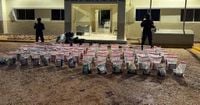In a dramatic escalation of anti-drug operations in the Caribbean, U.S. and Dominican Republic authorities carried out a joint military strike that destroyed a speedboat carrying over 2,200 pounds of cocaine, marking what officials described as the first operation of its kind in the region. The event, which unfolded on September 21, 2025, about 80 nautical miles south of Isla Beata, has sparked fierce debate about the legality and broader implications of such military actions, as reported by multiple outlets including UPI, Agence France-Presse, and the Dominican Republic’s National Directorate for Drug Control (DNCD).
The strike was part of a series of U.S.-led attacks on vessels suspected of drug trafficking, ordered by President Donald Trump. According to statements from Dominican and U.S. officials, the targeted speedboat was attempting to use Dominican territory as a bridge to move cocaine from South America to the United States. Intelligence sources, cited by the DNCD, confirmed the vessel was transiting along a known narcotrafficking route and was affiliated with what U.S. authorities have labeled a designated terrorist organization.
The operation began with U.S. Navy forces, acting on presidential orders, carrying out an aerial strike that destroyed the vessel in international waters. President Trump announced the strike on his social media platform, Truth Social, writing, “On my Orders, the Secretary of War [Pete Hegseth] ordered a lethal kinetic strike on a vessel affiliated with a Designated Terrorist Organization conducting narcotrafficking in the USSOUTHCOM area of responsibility. Intelligence confirmed the vessel was trafficking illicit narcotics, and was transiting along a known narcotrafficking passage en route to poison Americans.” He added, “STOP SELLING FENTANYL, NARCOTICS, AND ILLEGAL DRUGS IN AMERICA, AND COMMITTING VIOLENCE AND TERRORISM AGAINST AMERICANS!!!”
The aftermath of the strike saw Dominican Republic authorities, including the Navy and the DNCD, move swiftly to recover what remained. At a press conference, officials confirmed the seizure of 377 packages of cocaine, with about 60 to 80 packages destroyed in the explosion. Some of the recovered bricks bore the word “MEN,” a detail highlighted in video footage released by Dominican authorities. The DNCD emphasized the historic nature of the operation, stating, “It is noteworthy that this is the first time in history that the Dominican Republic and the United States have carried out a joint operation against narcoterrorism in the Caribbean region.”
The operation was not an isolated event. It was the third such strike in September 2025, following earlier attacks on boats allegedly linked to Venezuelan drug cartels. The first strike, announced on September 2, killed 11 people identified by U.S. officials as members of the Venezuelan gang Tren de Aragua. The second strike also targeted a boat of Venezuelan origin, resulting in the deaths of three individuals described as cartel members. President Trump has repeatedly accused Venezuelan President Nicolás Maduro of overseeing drug trafficking and organized crime, labeling him a cartel leader. The Trump administration’s stance has been clear: the fight against narcotrafficking in the region is not just a law enforcement issue but a matter of national security.
Dominican President Luis Abinader has publicly pledged to strengthen collaboration with the United States in combatting transnational criminal networks. U.S. Secretary of State Marco Rubio praised the Dominican Republic’s efforts, stating that intercepting drugs “destined for the streets of the United States” demonstrates the value of international cooperation. The Pentagon, for its part, deployed thousands of troops, eight warships, and a submarine to the southern Caribbean in August 2025, signaling a significant escalation in the U.S. campaign against drug cartels operating in the region.
Yet, the aggressive approach has not been without controversy. Human rights organizations, including Human Rights Watch, have condemned the strikes as unlawful extrajudicial killings, arguing that such actions violate international human rights law and the right to life under the International Covenant on Civil and Political Rights. Sarah Yager, Washington director at Human Rights Watch, remarked, “U.S. officials cannot summarily kill people they accuse of smuggling drugs. The problem of narcotics entering the United States is not an armed conflict, and U.S. officials cannot circumvent their human rights obligations by pretending otherwise.”
Legal and political opposition has also emerged within the United States. Democratic senators Adam Schiff of California and Tim Kaine of Virginia have introduced a resolution under the War Powers Act seeking to block further U.S. military strikes on Venezuelan vessels. Senator Jack Reed of Rhode Island, the ranking Democrat on the Senate Armed Services Committee, issued a sharp rebuke, stating, “No president can secretly wage war or carry out unjustified killings — that is authoritarianism, not democracy. These reckless, unauthorized operations not only put American lives at risk, they threaten to ignite a war with Venezuela that would drag our nation into a conflict we did not choose.”
The White House, however, maintains that the president is acting within his constitutional powers as commander in chief to protect Americans from national security threats. Following the first strike, the administration sent a notice to Congress asserting the authority to direct additional military operations as necessary. The notification argued that such actions are justified by the immediate threat posed by narcoterrorist organizations attempting to smuggle fentanyl and other dangerous drugs into the country.
For their part, Venezuelan officials have pushed back strongly against the U.S. narrative. President Maduro has denied all allegations of drug trafficking, describing the U.S. naval buildup as a “bloody threat” against his country. Venezuelan Interior Minister Diosdado Cabello told state television that local investigations confirmed that those killed in the initial strike were civilians with no ties to Tren de Aragua or any drug trafficking activities. In a further show of defiance, Venezuelan fighter jets reportedly flew near U.S. naval ships earlier in September, an incident described by Defense Department officials as a “game of chicken.”
As the debate over the legality and consequences of these strikes continues, the facts on the ground remain stark: the U.S. and Dominican Republic have shattered a major cocaine trafficking operation, but at the cost of escalating tensions in an already volatile region. The joint operation has set a precedent for future anti-narcoterrorism efforts, but it has also raised pressing questions about the balance between security and human rights, the scope of presidential war powers, and the risks of unintended conflict in the Caribbean basin.
With both sides digging in—U.S. officials defending their actions as necessary for national security, and critics warning of dangerous overreach—the region stands at a crossroads. Whether this historic strike will serve as a model for future cooperation or a cautionary tale remains to be seen.


